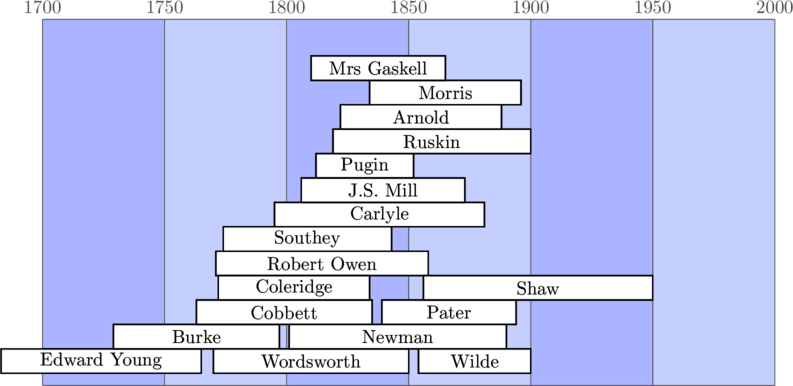(under construction)
Raymond Williams’ 1958 book Culture and Society 1780-1950 examines the impact of the industrial revolution in Britain on ideas about industry, society, art, culture etc – indeed claiming that the whole idea of “culture” grew out of this impact – and is a survey, history and criticism of the leading British writers and thinkers in those domains since 1780. I’ve collected here links to works mentioned in it, and some quotes from them.
Keywords (1976) is an expanded version of what was meant to be the appendix to Culture & Society, and includes detailed description of Williams’ motivation and methods.
Click titles to see quotes. Click [pdf] or ‘Save As’ to view/download the entire work.
Edward Young – Conjectures on Original Composition, 1759 [pdf]
Edmund Burke – Reflections on the French Revolution
William Cobbett
Robert Southey
Robert Owen – A New View of Society (1813) [pdf]
+++++ – The Life of Robert Owen: by Himself [pdf]
Wordsworth – preface to Lyrical Ballads [pdf]
Keats
Coleridge
Shelley – Defence of Poetry
A.W. Pugin – Contrasts
J.S. Mill – Essay on Bentham (1838) [read online]
+++++ – Essay on Coleridge (1840) [read online]
Thomas Carlyle – Signs of the Times (1829) [read online]
+++++ – Sartor Resartus (1836)
+++++ – Chartism (1840)
+++++ – On Heroes and Hero-Worship (1841)
+++++ – Latter-Day Pamphlets (1850)
+++++ – Past and Present (1843)
+++++ – Shooting Niagara – And After? (1867) [read online]
Industrial novels:
Benjamin Disraeli – Sybil, or The Two Nations (1845)
Charles Dickens – Hard Times (1854)
Charles Kingsley – Alton Locke, Tailor and Poet (1850)
George Eliot – Felix Holt (1866)
John Ruskin – Unto This Last
+++++ – The Two Paths
+++++ – The Crown of Wild Olive
+++++ – Stones of Venice
+++++ – Modern Painters
+++++ – Sesame and Lilies
John Henry Newman
Matthew Arnold – Culture and Anarchy
William Morris – How I Became a Socialist
Walter Pater – The Renaissance
W.H. Mallock – The New Republic
Oscar Wilde – The Soul of Man Under Socialism
George Gissing – New Grub Street
+++++ – The Nether World
+++++ – Demos
George Bernard Shaw
Hilaire Belloc – The Servile State
T.E. Hulme – Cinders
D.H. Lawrence

On Culture and Society
Terry Eagleton, Criticism and Ideology, London 1976, ch. 1
Francis Mulhern – Culture and Society, Then and Now (2009), New Left Review
Paul Jones – Raymond Williams’s Sociology of Culture: A Critical Reconstruction, 2004
Edward Young – Conjectures on Original Composition, 1759 [pdf]
and to share ambition with no less than Cæsar, who declared he had rather be the first in a village, than the second at Rome.
After all, the first ancients had no merit in being Originals : They could not be Imitators. Modern writers have a choice to make ; and therefore have a merit in their power. They may soar in the regions of liberty or move in the soft fetters of easy imitation ; and imitation has as many plausible reasons to urge as Pleasure had to offer to Hercules. Hercules made the choice of an hero, and so became immortal. -p10
Must we then, you say, not imitate antient authors ? Imitate them, by all means ; but imitate aright. … Tread in [Homer’s] steps to the sole fountain of immortality ; drink where he drank, at the true Helicon, that is, at the breast of nature : Imitate ; but imitate not the Composition, but the Man. -p11
…rules, like crutches, are a needful aid to the lame, tho’ an impediment to the strong. -p14
‘Genius often then deserves most to be praised, when it is most sure to be condemned ; that is, when its excellence, from mounting high, to weak eyes is quite out of sight.’ -p14
…by a spirit of Imitation we counteract nature, and thwart her design. She brings us into the world all Originals : No two faces, no two minds, are just alike ; but all bear nature’s evident mark of separation on them. Born Originals, how comes it to pass that we die Copies ? -p19-20